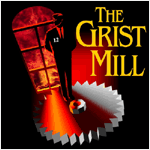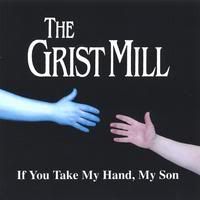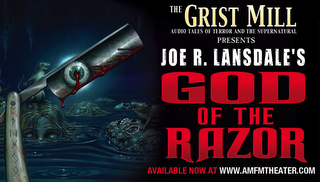Sound Bites From The Grist Mill
By, Vince A. Liaguno
Ever hanker for a bit of old-fashioned horror, those simpler days of nostalgic chills and thrills when the genre's effectiveness was a true sensory experience of sound and imagination? Then, welcome to The Grist Mill, a welcome throwback to the glorious age of dramatized radio shows like The Shadow and Lights Out. With chilling sound effects taking the place of movie special effects and a greater reliance on music and vocal nuance to create mood and enhance the listeners’ sense of dread and terror, The Grist Mill is true chiller theater for the ears.
Dark Scribe Magazine recently caught up with Grist Mill producer Scott Hickey who explains the enduring popularity of this venerable medium.
 Dark Scribe Magazine: What was the catalyst behind The Grist Mill?
Dark Scribe Magazine: What was the catalyst behind The Grist Mill?
Scott Hickey: I was a big fan of all things horror from very early on. I watched Dark Shadows on TV when I was five years old. I also fell in love with The CBS Radio Mystery Theater when I was about ten. I would listen with the radio under my pillow to audio adaptations of classic horror stories in complete darkness. It's very scary when you're only ten. It really fired up my imagination. The thrill of being frightened in the dark never left me.
When I was about thirty, I found myself with some recording equipment left over from a band I was in that fizzled out. I thought "What next?" I remembered the thrill of the audio show I listened to as a kid and thought I'd give it a try.
Dark Scribe: Which old-time radio shows most inspired you?
Scott Hickey: Some time after CBSRMT went off the air, I discovered what is called old time radio. Great shows like The Witches Tale, Light's Out, The Hall of Fantasy and Suspense could terrify me just like CBSRMT could. Some were a bit old and outdated, but many were just as frightening as the day they were recorded.
Dark Scribe: How do you decide which works to adapt as audio productions?
Scott Hickey: I look for short stories that are dialogue driven. There are lots of great short stories out there that read well, but are not very adaptable for audio.
Dark Scribe: What makes the horror genre so adaptable to the audio format?
Scott Hickey: It engages your imagination like few genres can. It can get very personal in that way. When the scariest monster that ever was bursts through the door, it looks different to every listener. It can play on some very basic fears. It can also get very violent and very gross without to much mess in production.
Dark Scribe: How long does an audio production take, from conception to final edit?
Scott Hickey: It varies, based on the cast and sound design of the recording. It can be difficult to get five very good actors in one room for the amount we pay. We decide on a story and develop a script. We get a cast together and do a read through. Shortly after, we record just the voices. The rest is multitracked in via computer.Since this is not a full time production, times can vary. When we're all available, it can take about six months.
Dark Scribe: Do you work with a consistent stable of voice talent – or are auditions held for each audio production?
Scott Hickey: We have had small stables of talent for a time. Some of them get busy with plays or movies, so the voices can vary. Idon't think you want to use the same voices too much. It can hamper the illusion of characters if you recognize the same voice from another story. We're fortunate to have a few people who can do many voices.
Dark Scribe: What goes into the production budget for an audio production? What are the ballpark costs to produce a typical audio show?
Scott Hickey: It can vary wildly. Some productions may have only a few people and very few sound effects. Some may have no music. Some authors want more money. Recording time in the studio can vary, too. So there's no set amount. A ballpark figure would be $2,500 to $3,500 from beginning to end.
Dark Scribe: In an age when the arts are gravitating toward more advanced and high-tech visual mediums, why do you think there is a market for audio productions?
Scott Hickey: Several reasons. People spend more time traveling than ever, it seems. Some people like to listen to something entertaining other than music. Look at the audio book industry. Lots of people are listening to audio for entertainment. There's also the wonderful world of podcasts.
Dark Scribe: What has been your personal favorite Grist Mill production and why?
 Scott Hickey: I have several. The first one we did, Pandora's Head, is a favorite. Great story for audio, but very primative in production values. Hey, I was just learning then. I think our newest production, Joe R. Lansdale's God of the Razor is the best thing we've done so far. Everything just seems to click. It's a modern story unlike anything else done in audio.
Scott Hickey: I have several. The first one we did, Pandora's Head, is a favorite. Great story for audio, but very primative in production values. Hey, I was just learning then. I think our newest production, Joe R. Lansdale's God of the Razor is the best thing we've done so far. Everything just seems to click. It's a modern story unlike anything else done in audio.
Dark Scribe: Which works of horror are under current consideration for being produced by The Grist Mill?
Scott Hickey: The most recent one is F. Paul Wilson's Slasher. I am a member of The Horror Writer's Association, so I've been able to approach many authors about getting the rights to their material. Mort Castle has been very instrumental in introducing me to authors. Thomas Monteleone has expressed interest, so I think he could be the next one.
For more information on The Grist Mill or to purchase a CD of one of their audio shows, visit their website.




Reader Comments